Peppermint tea offers more than a refreshing flavor — it delivers real, science-backed health benefits for your body and mind.
Packed with natural compounds like menthol and rosmarinic acid, peppermint tea can ease digestion, relieve headaches, support relaxation, and strengthen your immune system — all without caffeine or calories.
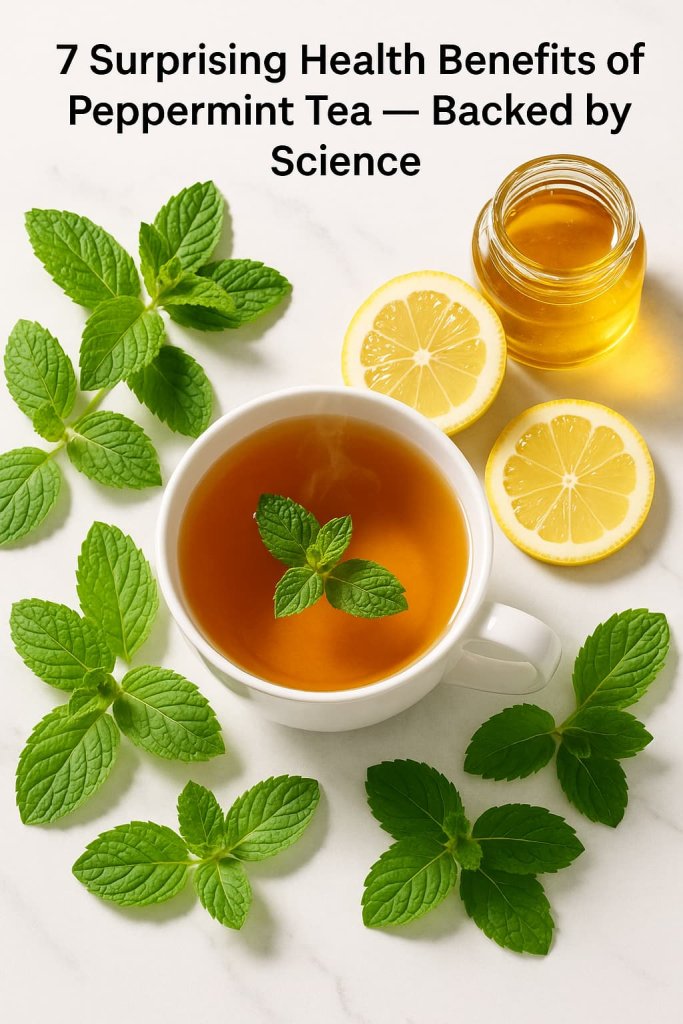
Understanding the benefits of peppermint tea helps you make smarter choices for your daily wellness routine. Whether you’re seeking relief from bloating, a natural stress soother, or a bedtime drink that promotes relaxation, peppermint tea offers a gentle yet powerful solution.
In this article, we’ll explore 7 surprising health benefits of peppermint tea — all backed by modern research — plus safety tips, ideal daily dosage, and answers to the most common questions people ask about this refreshing herbal drink.
What Is Peppermint Tea?
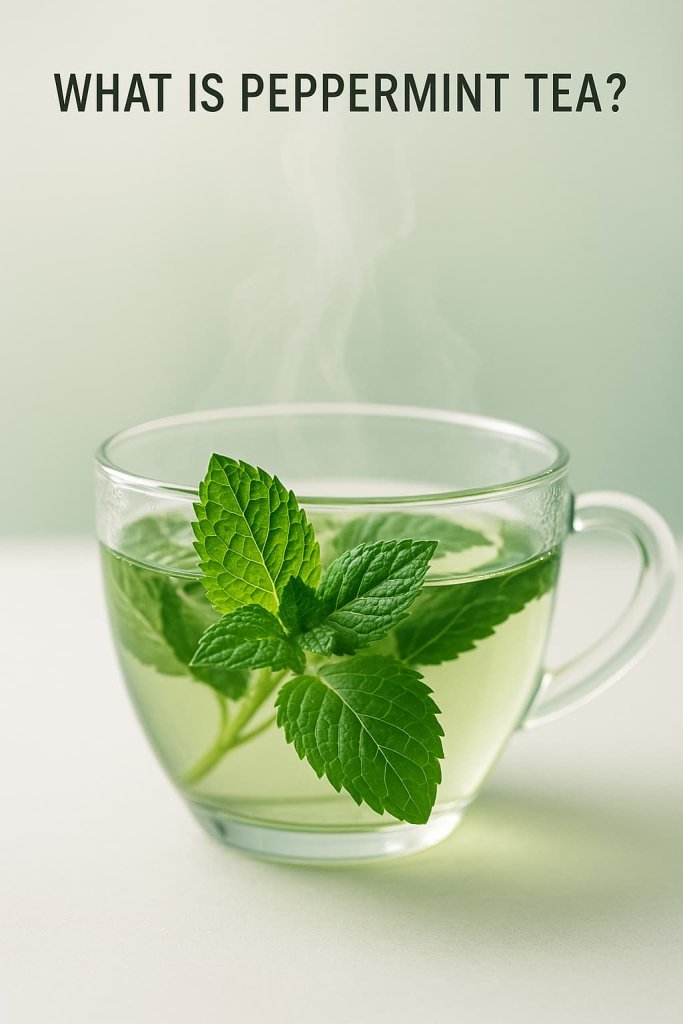
Peppermint tea is a caffeine-free herbal infusion made from the dried leaves of the Mentha × piperita plant — a natural hybrid between spearmint (Mentha spicata) and watermint (Mentha aquatica). Known for its invigorating aroma and cooling taste, peppermint tea has been used for centuries in traditional medicine to ease digestion, calm the mind, and refresh the body.
Unlike black or green tea, peppermint tea doesn’t come from the Camellia sinensis plant, which means it’s naturally caffeine-free, making it a great choice for evening relaxation or for people who are sensitive to caffeine.
What makes peppermint tea so beneficial lies in its bioactive compounds — mainly menthol, menthone, and rosmarinic acid. These natural chemicals are responsible for its signature coolness and offer proven health benefits, such as anti-inflammatory, antibacterial, and antioxidant effects.
According to Medical News Today and the National Center for Complementary and Integrative Health (NCCIH), these compounds can help relax the muscles of the gastrointestinal tract, open airways, and even improve alertness through aroma stimulation.
Peppermint tea is also rich in flavonoids and polyphenols, which support overall wellness by protecting cells from oxidative stress. For those seeking a natural way to soothe digestion, boost mood, or freshen breath, this refreshing herbal tea is both delicious and scientifically supported.
Why Peppermint Tea Matters for Your Health
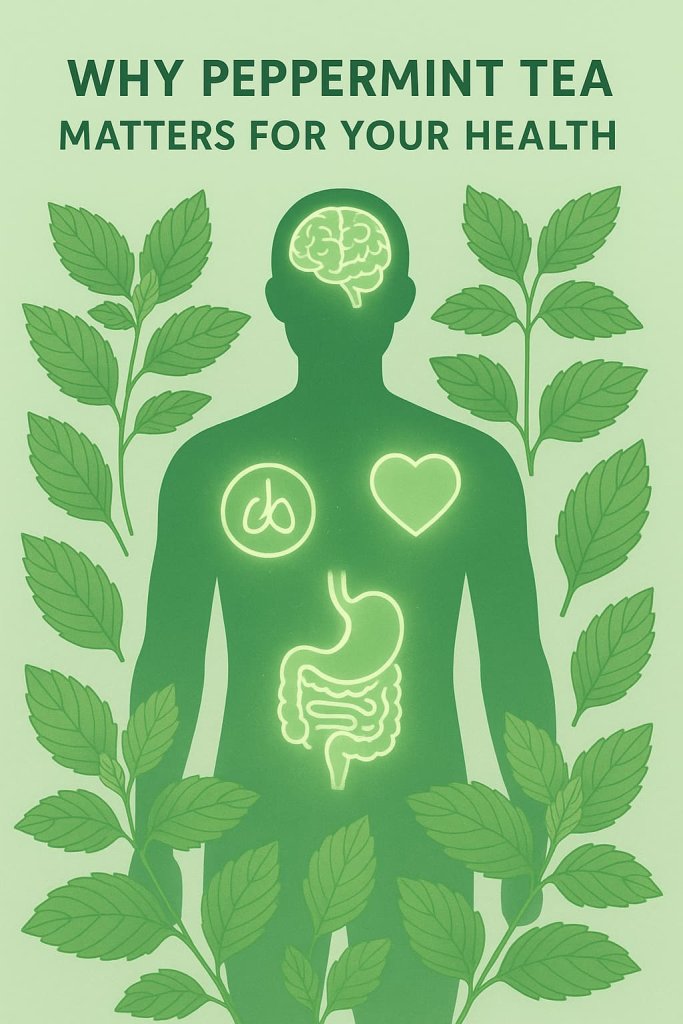
Peppermint tea isn’t just a refreshing drink — it’s a powerful herbal remedy with science-backed health benefits that go far beyond taste.
Understanding how it supports your body helps you make better daily wellness choices, especially if you’re looking for natural ways to improve digestion, relieve stress, and boost immunity.
Modern research shows that peppermint contains bioactive compounds such as menthol, menthone, and rosmarinic acid, which provide a wide range of therapeutic effects — from soothing the stomach to enhancing brain function. According to the Cleveland Clinic, these compounds work as natural relaxants and antioxidants, promoting overall balance in the body.
Because peppermint tea is caffeine-free and low in calories, it’s one of the healthiest beverages you can include in your daily routine. It’s suitable for nearly everyone — from people seeking gentle digestive relief to those avoiding stimulants or artificial ingredients.
Peppermint’s cooling menthol also acts as a natural decongestant and mood enhancer, making it beneficial during seasonal changes or stressful days. A warm cup can calm your nerves, ease bloating, and clear your mind — all at once.
Simply put, peppermint tea is a holistic health booster that supports multiple systems:
- Digestive system: Relaxes intestinal muscles and reduces bloating
- Respiratory system: Opens nasal passages and soothes sinuses
- Nervous system: Promotes relaxation and mental clarity
- Immune system: Provides antioxidants that protect against illness
As you’ll see in the next sections, each of these benefits is scientifically backed and easy to achieve with just a few cups of peppermint tea per day.
7 Science-Backed Health Benefits of Peppermint Tea
1. Eases Digestive Discomfort and Bloating
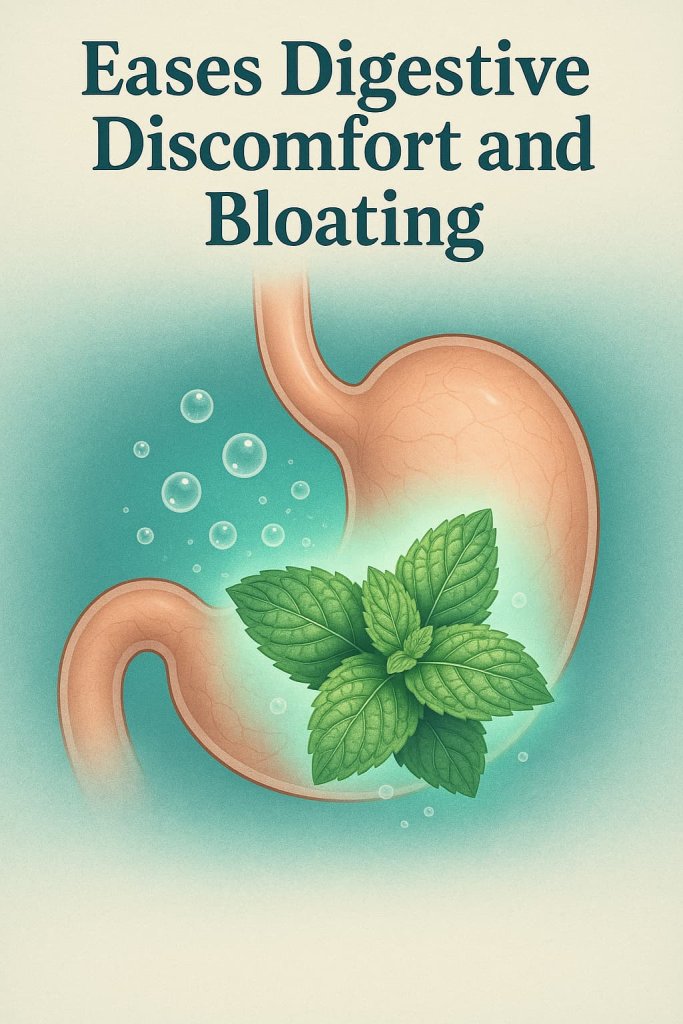
Peppermint tea is one of the most popular natural remedies for digestive discomfort, including bloating, gas, and indigestion. Its active compound menthol acts as a smooth muscle relaxant, soothing the lining of the gastrointestinal tract. This helps food and gas pass more easily, reducing cramps and bloating.
According to the National Center for Complementary and Integrative Health (NCCIH), clinical studies show that peppermint oil — and by extension, peppermint tea — can relieve symptoms of irritable bowel syndrome (IBS) by relaxing intestinal muscles and decreasing spasms.
How to use it effectively:
- Enjoy a warm cup of peppermint tea after meals to aid digestion and prevent bloating.
- Avoid drinking it if you suffer from GERD or acid reflux, as peppermint may relax the esophageal sphincter and worsen heartburn symptoms.
For a natural digestive aid, peppermint tea is both gentle and effective, offering relief without the need for over-the-counter antacids.
2. Helps Relieve Headaches and Migraines

Peppermint’s cooling sensation isn’t just refreshing — it can also ease tension headaches and mild migraines. The compound menthol helps relax muscles and improve blood flow in the forehead and temples, providing a calming analgesic effect.
A 2023 study published in Frontiers in Neurology found that applying peppermint oil reduced headache intensity within 15 minutes — comparable to standard pain relievers. While tea offers a gentler effect than essential oils, inhaling the steam while sipping peppermint tea can amplify relaxation and reduce headache discomfort.
Research summarized by Healthline notes that the aroma of peppermint stimulates the trigeminal nerve, which may play a role in headache relief and improved alertness.
Tip: Drink peppermint tea in a quiet space and take deep breaths of its steam — this dual approach soothes both the body and mind naturally.
3. Reduces Menstrual Cramps Naturally

Many women experience painful menstrual cramps, and peppermint tea offers a natural and gentle way to find relief. The menthol in peppermint acts as a natural antispasmodic, helping relax the uterine muscles that cause cramping.
A 2022 clinical trial in the Journal of Obstetrics and Gynaecology Research reported that peppermint extract was as effective as ibuprofen for mild to moderate menstrual pain — without adverse side effects.
Additionally, peppermint tea’s anti-inflammatory and analgesic properties can soothe abdominal discomfort and promote a sense of relaxation during menstruation.
According to Medical News Today, regularly consuming herbal teas like peppermint may also improve mood and reduce fatigue during periods, enhancing overall well-being.
Pro tip: Start drinking peppermint tea a few days before your cycle begins to preemptively relax uterine muscles.
4. Clears Nasal Congestion and Supports Sinus Health
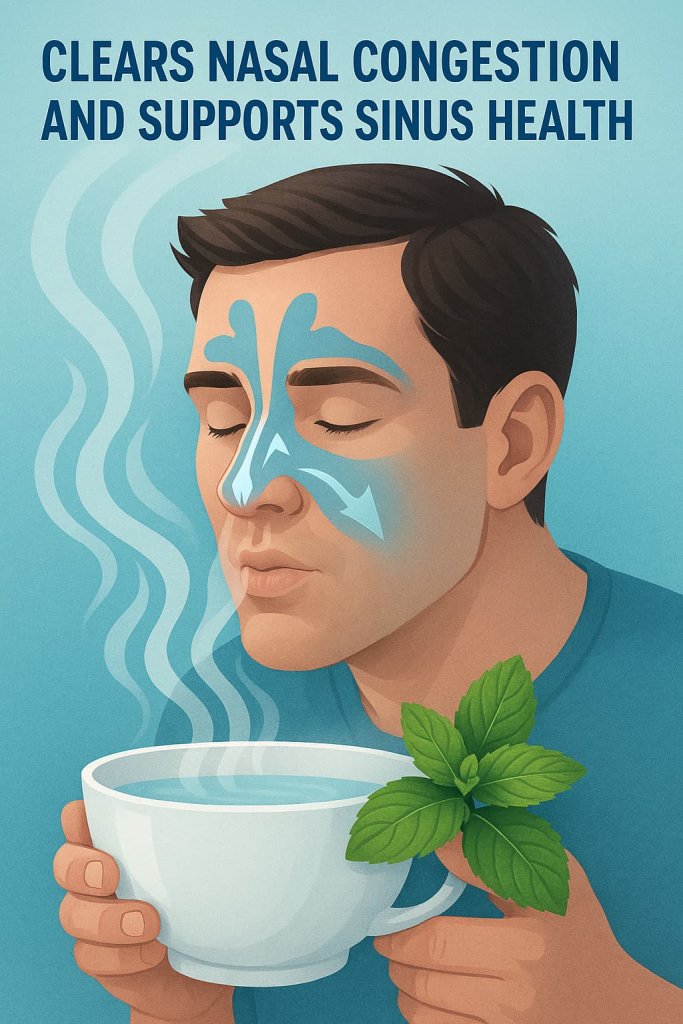
If you’re battling a cold or seasonal allergies, peppermint tea can act as a natural decongestant. The menthol vapors open the nasal passages, allowing for easier breathing and reducing sinus pressure.
Peppermint’s antiviral and anti-inflammatory compounds help combat the root causes of respiratory discomfort. A review in Phytotherapy Research (2023) confirmed that menthol improves nasal airflow and soothes sore throats.
Inhaling the steam from a freshly brewed cup enhances these effects — it’s a simple home remedy supported by both science and tradition.
The experts at WebMD also highlight that peppermint’s antimicrobial activity may help reduce infection-causing bacteria in the respiratory tract.
For best results:
- Sip hot peppermint tea slowly, inhaling the aromatic steam.
- Combine with honey for an extra soothing effect on sore throats and congestion.
5. Freshens Breath and Fights Oral Bacteria
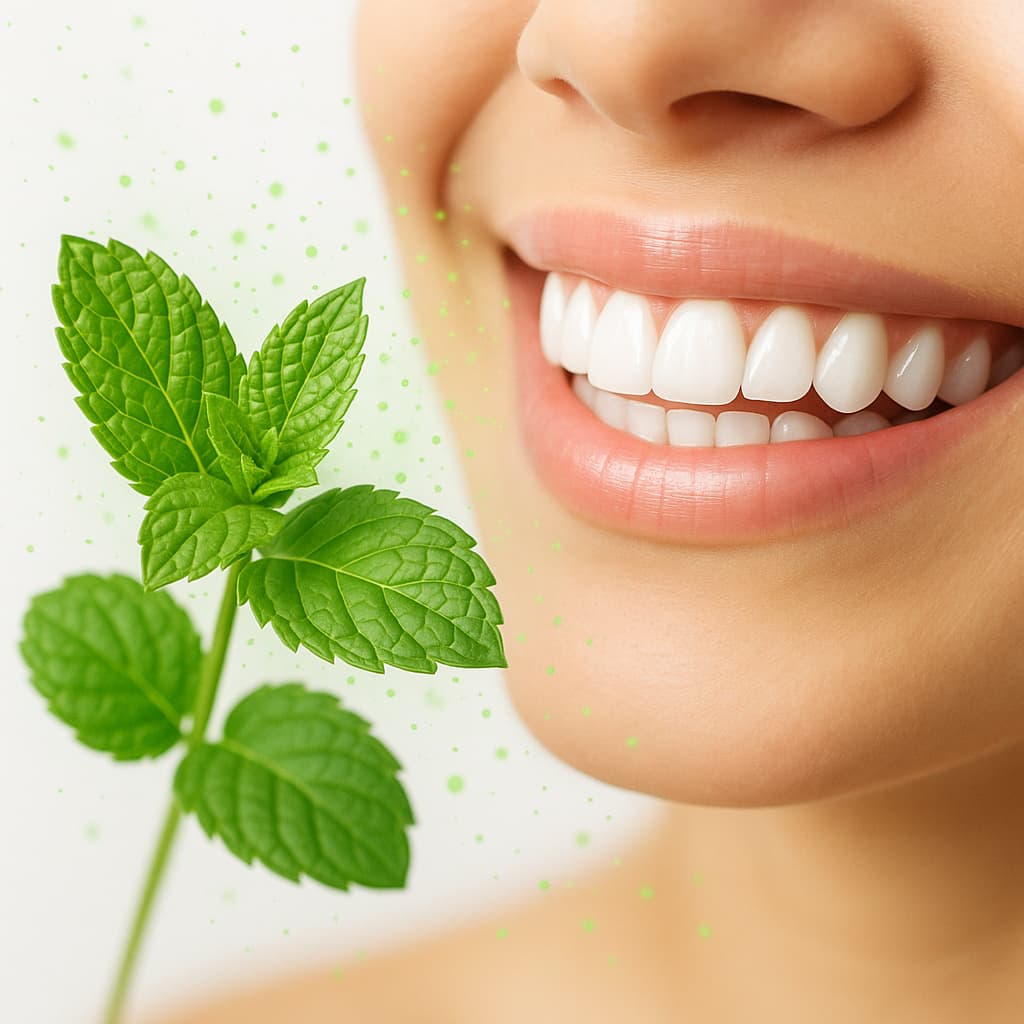
Peppermint tea isn’t just refreshing — it’s nature’s mouthwash. Thanks to its antibacterial and antimicrobial properties, it helps kill odor-causing bacteria in the mouth and throat.
Drinking peppermint tea regularly can reduce bad breath (halitosis) and promote better oral hygiene. Menthol also cools the mouth, providing a lasting feeling of freshness.
A review from Healthline notes that peppermint compounds can inhibit the growth of bacteria such as Streptococcus mutans, which is commonly responsible for plaque buildup and bad breath.
Quick tip: After meals, swap sugary gum for a warm cup of peppermint tea to naturally cleanse your palate and freshen your breath.
6. Enhances Mental Clarity and Focus
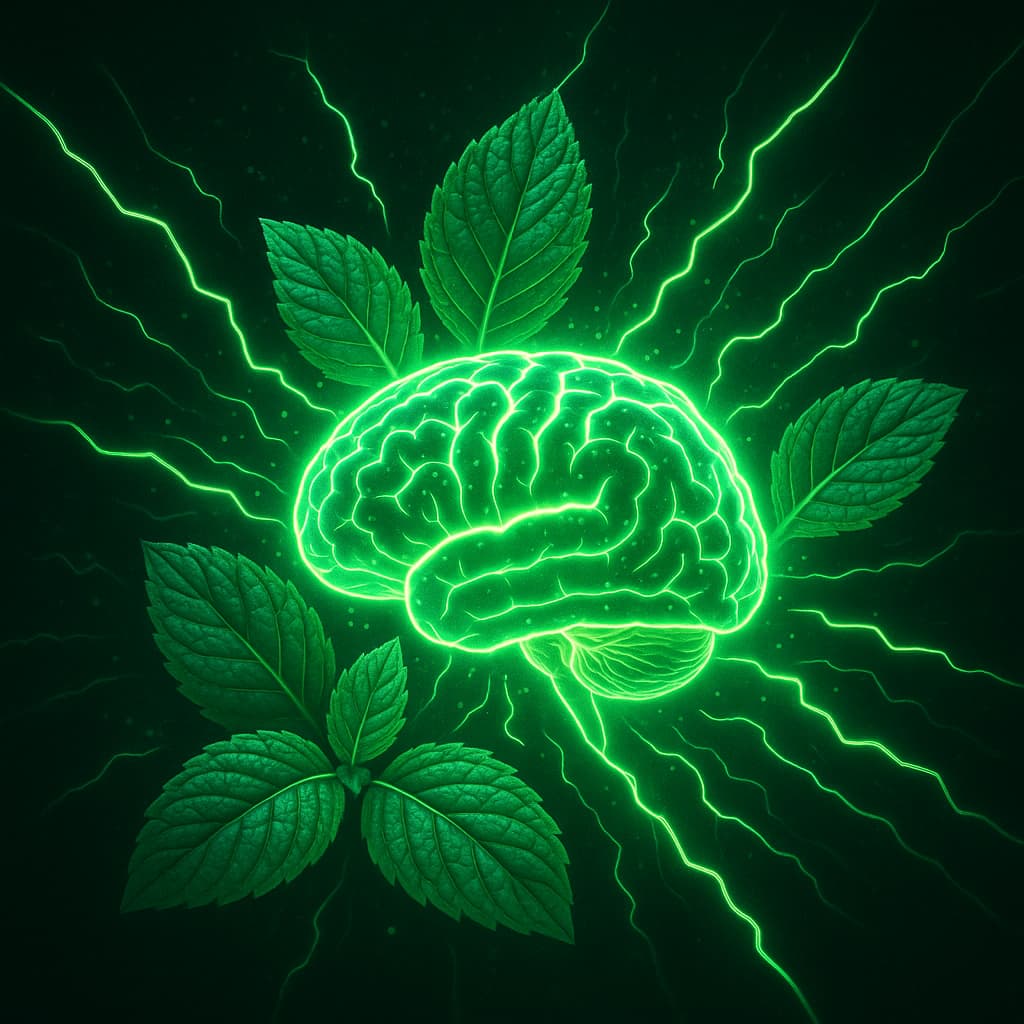
Peppermint tea doesn’t just calm your body — it can also stimulate your mind. Its refreshing scent and flavor are shown to improve alertness, memory, and overall cognitive performance.
A study from Northumbria University found that participants exposed to peppermint aroma performed better in memory and attention tests. Researchers suggest that menthol interacts with brain pathways linked to focus and motivation.
Inhaling peppermint while drinking the tea can help you feel more awake and mentally clear, making it a perfect caffeine-free alternative to coffee.
According to a report by Harvard Health Publishing, aromatic herbs like peppermint may boost alertness by stimulating the central nervous system and improving oxygen flow to the brain.
Best time to drink: Morning or early afternoon when you need a mental energy lift — without the crash.
7. Rich in Antioxidants and May Support Immunity

Peppermint tea is a powerhouse of antioxidants and phytonutrients that protect your cells from oxidative stress — a key factor in aging and disease.
Compounds like rosmarinic acid, eriocitrin, and luteolin give peppermint its strong free-radical-fighting power.
Laboratory research published on PubMed shows that peppermint extracts have antiviral, antibacterial, and anti-inflammatory properties. These effects may help strengthen your immune system and defend against seasonal infections.
The antioxidants in peppermint also support liver health and may lower the risk of chronic diseases linked to inflammation.
For added benefits, mix your tea with raw honey and fresh lemon juice for a comforting, immune-boosting beverage during cold and flu season.
Did you know? The Cleveland Clinic confirms that peppermint tea can support the body’s natural defenses and help you recover faster from respiratory infections.
Recommended Dosage, Safety & Side Effects
While peppermint tea is widely considered safe and beneficial for most people, it’s still important to understand how much to drink, who should avoid it, and when it’s most effective. Moderation is key — even natural remedies can cause discomfort if overused.
How Much Peppermint Tea Can You Drink Daily?
Health experts generally recommend 1 to 3 cups per day for optimal benefits without side effects. Drinking peppermint tea regularly can help soothe digestion, calm nerves, and freshen breath — but excessive consumption may lead to stomach upset in sensitive individuals.
Here’s a quick daily guideline based on expert recommendations from the National Center for Complementary and Integrative Health (NCCIH) and WebMD:
| Group | Safe Daily Amount | Notes |
|---|---|---|
| Healthy Adults | 1–3 cups daily | Safe for general use; drink after meals or before bed |
| Pregnant Women | 1 cup occasionally | Generally safe in moderation; consult your OB-GYN first |
| Children (6+) | ½–1 cup mild brew | Avoid strong or concentrated peppermint tea |
| People with GERD / Acid Reflux | Avoid | Peppermint may relax the esophageal sphincter and worsen symptoms |
| People on Certain Medications | Check with doctor | May interact with antacids, cyclosporine, or diabetes medications |
🚫 Who Should Avoid Peppermint Tea?
While peppermint tea is natural and gentle, it may not be suitable for everyone. You should avoid or limit peppermint tea if you have:
- GERD or chronic heartburn: Peppermint relaxes the lower esophageal sphincter, which can worsen acid reflux symptoms.
- Hiatal hernia: This condition can make reflux worse when combined with peppermint.
- Pregnancy (especially early stages): Some sources, including Medical News Today, note that excessive peppermint intake may trigger uterine relaxation in rare cases.
- Allergy to mint or menthol: Avoid all mint-based teas and products.
- Medication interactions: Peppermint may interfere with certain liver-metabolized drugs (like cyclosporine) and stomach acid reducers. Always confirm with your healthcare provider.
☕ Best Time to Drink Peppermint Tea
Timing your tea right can help you get the most out of its natural effects:
| Time of Day | Benefits |
|---|---|
| After Meals | Aids digestion and reduces bloating or nausea |
| Midday | Enhances focus and refreshes breath naturally |
| Before Bed | Promotes relaxation and improves sleep quality (caffeine-free) |
| During Cold/Allergy Season | Helps open nasal passages and soothe the throat |
For best results, drink freshly brewed peppermint tea — avoid bottled versions that may contain added sugars or artificial flavorings.
⚠️ Possible Side Effects of Overconsumption
While side effects are rare, excessive or very strong peppermint tea can sometimes cause:
- Mild heartburn or acid reflux (especially in GERD patients)
- Allergic reactions like rashes or throat irritation (rare)
- Slower iron absorption if consumed in very large quantities
If you notice discomfort, reduce your intake or consult a doctor — particularly if you’re pregnant, nursing, or taking medication.
✅ Quick Safety Summary
- Stick to 1–3 cups per day for safe use.
- Avoid drinking on an empty stomach if you have reflux.
- Choose organic, caffeine-free peppermint leaves for the cleanest brew.
- Always consult your doctor before use if you’re pregnant or on medication.
Frequently Asked Questions (FAQ)
Here are some of the most common questions people ask about peppermint tea, backed by credible research and expert insights from sources like Healthline, WebMD, and the Cleveland Clinic.
1. Is Peppermint Tea Safe During Pregnancy?
Yes, peppermint tea is generally safe in moderate amounts during pregnancy, especially for easing nausea and digestive discomfort.
According to Medical News Today, peppermint tea may help relieve morning sickness and heartburn in expectant mothers.
However, excessive intake is not advised — limit it to one cup per day and always consult your OB-GYN first. Large amounts may overstimulate the uterus or relax the muscles too much.
👉 Best practice: Choose pure peppermint leaf tea and avoid blends containing caffeine or other herbs unless approved by your healthcare provider.
2. Can Peppermint Tea Help with IBS (Irritable Bowel Syndrome)?
Yes — peppermint tea may relieve mild IBS symptoms such as bloating, abdominal pain, and gas.
The National Center for Complementary and Integrative Health (NCCIH) highlights that menthol in peppermint oil relaxes intestinal muscles and may reduce spasms in the colon.
While peppermint oil capsules have stronger clinical evidence, drinking the tea can still provide soothing effects for mild discomfort.
👉 Tip: Enjoy a warm cup after meals to aid digestion naturally.
3. Does Peppermint Tea Help with Sleep or Anxiety?
Absolutely. Peppermint tea is caffeine-free and contains compounds that help relax muscles and calm the mind.
According to Healthline, menthol acts as a mild natural sedative, reducing restlessness and tension.
Enjoying peppermint tea before bedtime can promote relaxation and improve sleep quality, especially when paired with mindful breathing.
👉 Bonus tip: Add a teaspoon of honey for a soothing nighttime drink that supports relaxation and throat comfort.
4. Can I Drink Peppermint Tea Every Day?
Yes, you can safely drink 1–3 cups of peppermint tea daily.
Regular consumption supports digestion, reduces headaches, and provides antioxidants that strengthen the immune system.
However, moderation is important — people with acid reflux or GERD should limit intake since peppermint can relax the lower esophageal sphincter, potentially worsening heartburn.
The Cleveland Clinic recommends drinking peppermint tea after meals or before bedtime for the best results.
5. Does Peppermint Tea Contain Caffeine?
No — peppermint tea is 100% caffeine-free, making it perfect for anyone sensitive to caffeine or looking to unwind in the evening.
Unlike black or green tea, peppermint tea is made from herbal leaves rather than the Camellia sinensis plant, so it delivers relaxation without the jittery effects of caffeine.
It’s a great alternative to coffee or energy drinks if you’re aiming to cut back on caffeine while still enjoying a warm, flavorful beverage.
6. Can Peppermint Tea Help with Weight Loss?
Indirectly, yes. Peppermint tea doesn’t burn fat on its own, but it can support weight management by improving digestion, reducing bloating, and curbing appetite.
Some studies suggest that the scent of peppermint may suppress hunger cravings, leading to lower calorie intake.
As part of a balanced diet and active lifestyle, peppermint tea is a calorie-free, hydrating drink that supports your metabolism naturally.
7. Are There Any Side Effects of Peppermint Tea?
While generally safe, excessive consumption may cause heartburn, nausea, or allergic reactions in sensitive individuals.
If you have GERD, hiatal hernia, or are taking medications like cyclosporine, consult your doctor first.
Stick to 1–3 cups per day, choose organic loose-leaf or bagged tea, and avoid peppermint-flavored drinks with added sugars or artificial ingredients.
Conclusion
Peppermint tea is far more than a soothing, aromatic beverage — it’s a natural wellness booster backed by science. From easing digestive discomfort and headaches to improving focus, sleep, and immunity, this caffeine-free herbal tea supports your health from the inside out.
Its key compounds — menthol, menthone, and rosmarinic acid — deliver powerful antioxidant, anti-inflammatory, and relaxing properties, making it one of the most beneficial herbal drinks you can enjoy daily.
Whether you sip it after meals for digestion, before bed for relaxation, or during the day for a mental refresh, peppermint tea offers a simple and effective way to support your overall well-being naturally.
✅ Takeaway: Add 1–3 cups of peppermint tea to your daily wellness routine and experience its refreshing taste and remarkable health benefits — one sip at a time.
For best results, choose organic peppermint tea and brew it fresh to preserve its natural oils and healing compounds. Your body — and your mind — will thank you.
Research References
- National Center for Complementary and Integrative Health (NCCIH).
Peppermint Oil: Usefulness and Safety.
Updated 2024.
👉 https://www.nccih.nih.gov/health/peppermint-oil - Medical News Today.
Peppermint Tea: Benefits, Safety, and Side Effects.
Reviewed 2025.
👉 https://www.medicalnewstoday.com/articles/325242 - Cleveland Clinic.
Peppermint Tea Benefits: Soothing, Refreshing, and Healthy.
Updated 2024.
👉 https://health.clevelandclinic.org/peppermint-tea-benefits - Chumpitazi, B. P., et al. (2018).
The Physiologic Effects and Safety of Peppermint Oil and Its Efficacy in Irritable Bowel Syndrome and Other Functional Disorders.
Pediatric Gastroenterology, Hepatology & Nutrition.
👉 https://pubmed.ncbi.nlm.nih.gov/29577003/
